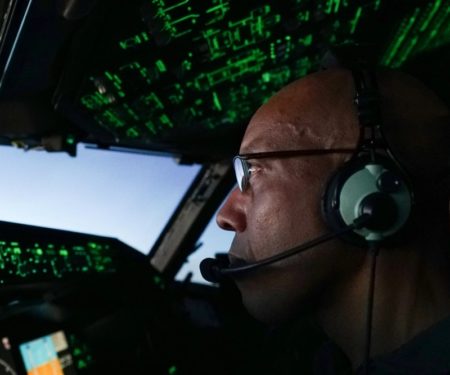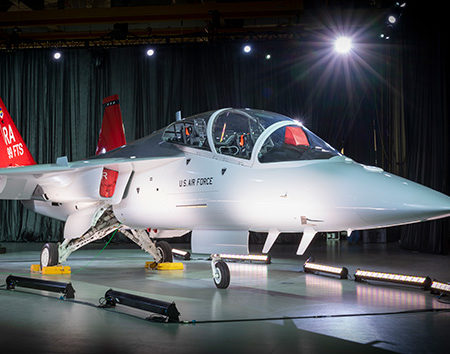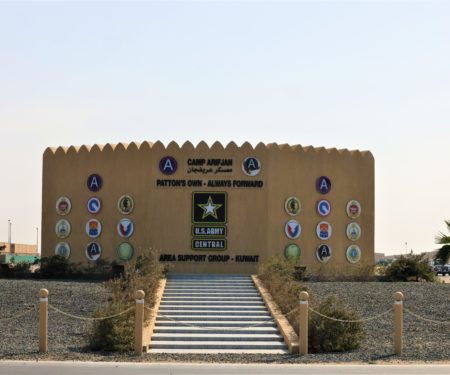‘A Proud, Butt-Kicking American Airman’: Biden Introduces Brown as Pick for Chairman
Brown Set to Be the 5th Air Force Chairman of the Joint Chiefs. Who Are the Others?
Everything You Need to Know About the Space Force’s Fitness Tracker PT Study
GAO: Boeing Unlikely to Meet Revised T-7 Schedule
5,000 Selected for Master Sergeant, But Promotion Rate Remains Low
Airman Dies in Kuwait in Non-Combat Incident
Radar Sweep
Pentagon Says Allies Will Unite to Train Ukrainians on F-16s, But Warns Jets Aren’t ‘Magic Weapons’
Defense Secretary Lloyd Austin said May 25 that European allies are developing a coordinated program to train Ukrainian forces on the F-16 fighter jet, but Pentagon leaders warned that it will be a costly and complex task and won’t be a magic solution to the war. Austin said the allies recognize that in addition to training, Ukraine will also need to be able to sustain and maintain the aircraft and have enough munitions. And he said air defense systems are still the weapons that Ukraine needs most in the broader effort to control the airspace.
With Ukraine Set to Get Another Weapon from Its Wish List, Democrats Push for More
Amid news that the White House will finally grant Ukraine’s long-sought request for F-16s, some Democrats in Congress are pushing for a more aggressive U.S. policy on Ukraine. “We need to expedite the transfer of the Abrams tanks,” Congressman Jason Crow, D-Colo., said in an interview, referring to 31 tanks the U.S. will send Ukraine this fall, after months of debate.
Defense Department Moving to Automate Polygraph Processes
Faced with a security clearance backlog, the Pentagon is looking for technologies to automate polygraph processes and credibility assessments to make them more efficient and effective. The Defense Innovation Unit (DIU)—which has outposts in Silicon Valley and other commercial tech hubs—has released a new solicitation for its “Polygraph+” program aimed at acquiring new capabilities to help the Pentagon detect lies and weed out untrustworthy people.
Go Deeper on Operational Imperatives
Air Force Secretary Frank Kendall has defined seven Operational Imperatives for the Department of the Air Force to work on, warning that “if we don't get them right, we will have unacceptable operational risk.” From a resilient space order of battle to the development of next-generation tactical air dominance and global strike platforms, these imperatives will define the Air Force for decades to come—Dive deeper into each one with our new “Operational Imperatives” pages highlighting all the latest news and developments on these critical efforts.
Intelligence Community Needs Integration Officer, DIA’s Berrier Says
The intelligence community needs an enterprise-level integration officer to help collaborate on complex challenges that cut across organizations, according to the director of the Defense Intelligence Agency. In November 2021, the DIA—which analyzes and distributes information in support of combat-related missions and foreign intelligence—established a similar role within its agency, naming Greg Ryckman its deputy director for global integration.
Boeing’s Ghost Bat Loyal Wingman Drone Spotted Hanging in US
Boeing revealed that its MQ-28 Ghost Bat is hanging out stateside in a first public look at the drone on U.S. soil, months after the Air Force said it wanted to conduct flight test experiments with the loyal wingman platform. Originally made for the Royal Australian Air Force, Breaking Defense previously reported in September that the U.S. Air Force was “getting ready” to take possession of the drone for the service’s own testing purposes. It’s unclear whether that testing has actually begun, though the drone’s arrival at Boeing’s Phantom Works facility here outside St. Louis, which is adjacent to Scott Air Force Base, suggests that testing could begin soon if it has not already.
DOD Plans South-Facing Over-the-Horizon Radar, Seeks to Begin Prototyping in FY24
The Pentagon is seeking authorization in fiscal year 2024 to begin prototyping a new homeland defense Over-the-Horizon Radar—with one each planned in the Northeast, Northwest, Alaska and a Southern-facing array—for improved long-range sensor coverage of aircraft, cruise missiles, maneuvering hypersonic missiles and maritime surface vehicle threats. The Air Force is seeking $516 million in fiscal year 2024 for the sensor project, including $428.7 million in operational systems development funding.
Time Constraints Prevent US Sale of F-35 Fighter Jets: RTAF
The Royal Thai Air Force (RTAF) has provided an explanation as to why the United States is not selling its F-35 fighter jets to Thailand at this time. There were several time constraints that prevented the U.S. from supplying its fifth-generation fighter jets to the Thai air force following the request for procurement, RTAF spokesman Prapas Sonjaidee said May 25.
Northrop Grumman Wins $45 Million Space Force Contract to Launch Small Weather Satellite
Northrop Grumman won a $45.5 million contract to launch a small weather satellite in 2025, the U.S. Space Force announced May 25. The company’s Minotaur 4 rocket will launch a payload called Electro-Optical Infrared (EO/IR) Weather System (EWS) prototype that will demonstrate commercial weather imaging technologies for military use. The launch contract was a task order awarded by the U.S. Space Force’s Orbital Services Program-4.
Air Force Instructor Pilot Tackles ‘Toughest Footrace on Earth’
Maj. Chas Kabanuck knows how it feels to be told to “pound sand.” The flight instructor at Laughlin Air Force Base, Texas, recently completed the Marathon des Sables—a six-day, approximately 250-kilometer (155-mile) ultramarathon through the Sahara Desert in Morocco, known as one of the toughest footraces on Earth.






